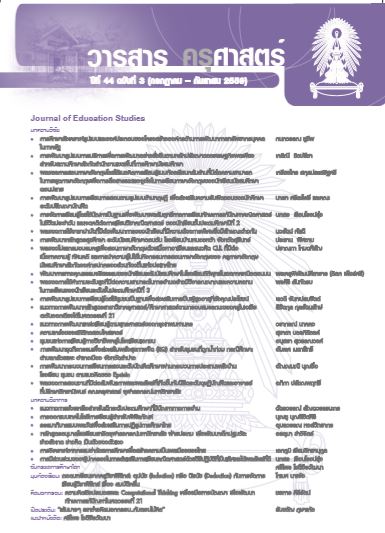ผลของการสอนงานที่มีต่อสัมพันธภาพและผลลัพธ์ที่เกิดขึ้นกับนิสิตระดับดุษฎีบัณฑิตและอาจารย์ที่ปรึกษาวิทยานิพนธ์ คณะครุศาสตร์ จุฬาลงกรณ์มหาวิทยาลัย Effects of Mentoring on Relationships and Doctoral Students’ and Dissertation Advisors’ Outcomes at the ...
Keywords:
การสอนงานการทำวิทยานิพนธ์, ผลลัพธ์ของการสอนงานต่ออาจารย์ที่ปรึกษา, ผลลัพธ์ของการสอนงานต่อนิสิต, สัมพันธภาพระหว่างอาจารย์ที่ปรึกษาและนิสิต, การให้คำปรึกษาวิทยานิพนธ์ระดับดุษฎีบัณฑิต, DISSERTATION MENTORING, ADVISOR’S MENTORING OUTCOMES, STUDENT’S MENTOR...Abstract
การวิจัยครั้งนี้เป็นการวิจัยผสมวิธีแบบคู่ขนานลู่เข้า (the convergent parallel mixed method design)มีวัตถุประสงค์เพื่อ 1. สำรวจและศึกษาอิทธิพลของการสอนงานการทำวิทยานิพนธ์ที่มีต่ออาจารย์ที่ปรึกษาวิทยานิพนธ์และนิสิตดุษฎีบัณฑิต เมื่อสัมพันธภาพระหว่างอาจารย์ที่ปรึกษาและนิสิตดุษฎีบัณฑิตเป็นตัวแปรส่งผ่านและภูมิหลังของอาจารย์ที่ปรึกษาวิทยานิพนธ์และนิสิตดุษฎีบัณฑิตเป็นตัวแปรควบคุมและ 2. ศึกษาปัจจัยสนับสนุนให้การสอนงานการทำวิทยานิพนธ์มีประสิทธิผล การวิจัยเชิงปริมาณเป็นวิจัยสำรวจเพื่อศึกษาความสัมพันธ์เชิงสาเหตุและผลระหว่างตัวแปรตามกรอบแนวคิดในการวิจัย โดยเก็บรวบรวมข้อมูลจากการสอบถามความคิดเห็นอาจารย์ที่ปรึกษาจำนวน 64 คนและนิสิตดุษฎีบัณฑิต คณะครุศาสตร์ จุฬาฯที่ศึกษาตั้งแต่ชั้นปี 2 ขึ้นไปจำนวน 120 คน และวิเคราะห์ข้อมูลโดยใช้สถิติบรรยาย การวิเคราะห์ความแปรปรวนทางเดียว การวิเคราะห์สหสัมพันธ์และการวิเคราะห์ถดถอยพหุคูณ ส่วนการวิจัยเชิงคุณภาพเป็นการศึกษาปัจจัยที่สนับสนุนให้การสอนงานการทำวิทยานิพนธ์มีประสิทธิผล โดยการสัมภาษณ์แบบเจาะลึกจากอาจารย์ที่ปรึกษา 6 คนและนิสิต 6 คนและวิเคราะห์ข้อมูลด้วยการวิเคราะห์เนื้อหา
ผลการวิเคราะห์ข้อมูลเชิงปริมาณพบว่า การสอนงานการทำวิทยานิพนธ์ตามการรับรู้ของอาจารย์ที่ปรึกษามีผลทั้งทางตรง (DE=.202) และทางอ้อม (IE=229) ต่อผลลัพธ์ที่เกิดขึ้นกับอาจารย์ที่ปรึกษา ในขณะที่สัมพันธภาพระหว่างอาจารย์ที่ปรึกษาและนิสิตมีอิทธิพลทางตรงต่อผลลัพธ์ที่เกิดขึ้นกับอาจารย์ที่ปรึกษา (DE=.489) ซึ่งสอดคล้องกับการรับรู้ของนิสิต คือ การสอนงานการทำวิทยานิพนธ์มีผลทั้งทางตรง (DE=.371) และทางอ้อม (IE=.147) ต่อผลลัพธ์ที่เกิดขึ้นกับนิสิต ในขณะที่สัมพันธภาพระหว่างอาจารย์ที่ปรึกษาและนิสิตมีอิทธิพลทางตรงต่อผลลัพธ์ที่เกิดขึ้นกับนิสิต (DE=.179) ส่วนผลการวิเคราะห์ข้อมูลเชิงคุณภาพเสริมผลการวิเคราะห์ข้อมูลเชิงปริมาณว่า นอกจากวิธีการ/พฤติกรรมการสอนงานของอาจารย์ที่ปรึกษาและสัมพันธภาพระหว่างอาจารย์ที่ปรึกษาและนิสิตแล้ว คุณสมบัติของอาจารย์ที่ปรึกษา คุณสมบัติและพฤติกรรมของนิสิต และระบบสนับสนุนการสอนงานการทำวิทยานิพนธ์ของสถาบัน ยังทำให้เกิดประสิทธิผลในการสอนงานการทำวิทยานิพนธ์
This study was a convergent parallel design, mixed methods research. The research purposes were as follows: 1. Explore and investigate the effects of dissertation mentoring on dissertation advisors and doctoral students with relationships between advisors and students as a mediating variable and advisors’ and students’ backgrounds as a controlled variable; 2. Investigate factors that enhance dissertation mentoring effectiveness. The quantitative research part aimed at investigating the causal relationships among variables in the conceptual frameworks. Perceptions of 64 advisors and 120 students from the Faculty of Education, Chulalongkorn University were collected using questionnaires and analyzed using descriptive statistics, ANOVA, correlation analysis, and multiple regression analysis. The qualitative research part investigated the factors enhancing dissertation mentoring effectiveness, employing in-depth interviews with 6 advisors and 6 students, and using a content analysis approach.
Findings from the quantitative data analysis showed that the advisor’s’ perceived dissertation mentoring had both direct(DE=.202) and indirect effects (IE=.229) on advisors’ outcomes, while the advisor-student relationships had direct effects (DE = .489) on advisors’ outcomes. Consistently, the students’ perceived dissertation mentoring had both direct(DE=.371) and indirect effects (IE=.147) on advisors’ outcomes, while the advisor-student relationships had direct effects (DE = .179) on advisors’ outcomes. Findings from qualitative data analysis also revealed in the quantitative data analysis that in addition to the advisors’ mentoring methods/behaviors and advisor-student relationships, the advisors’ attributes, the students’ attributes and behaviors, as well as the institutional support for dissertation mentoring also enhance dissertation mentoring effectiveness.




